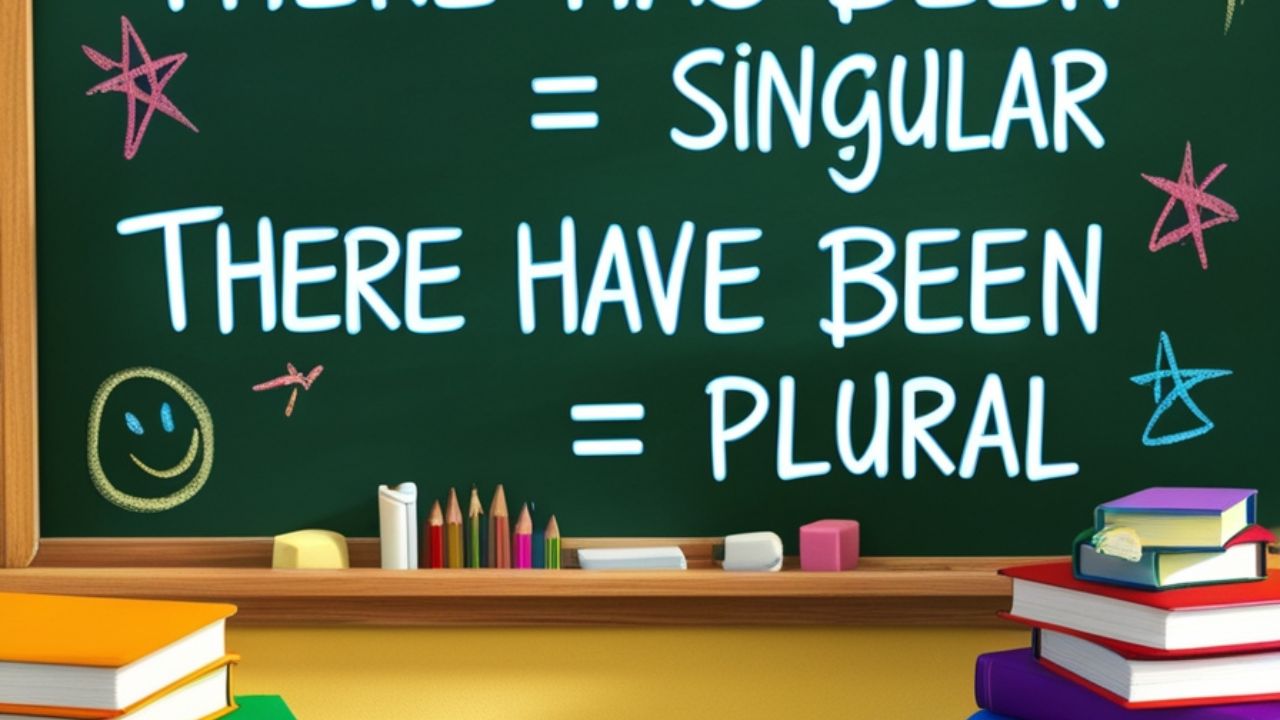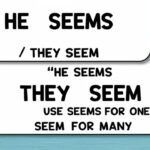There Has Been or There Have Been is about using the right verb with the right noun. There has been works when we talk about one thing. There have been fits when we mean more than one. This makes sentences clear.
Writers often mix up these forms, but remembering the rule is easy. Use there has been with a single event or uncountable idea like progress. Use there have been when describing many events, objects, or repeated actions.
Clear grammar builds strong communication. Using there has been or there have been correctly helps writing sound smart and correct. It makes schoolwork, emails, and even stories flow better. Strong grammar rules guide readers and support easy understanding every time.
Grasping the Basics: Singular vs. Plural Forms
Grasping the Basics: Singular vs. Plural Forms helps writers match nouns with the right verbs. A singular form means one person, object, or idea. A plural form means more than one. Using the right form keeps sentences neat and correct.
In grammar, the singular form connects with words like “is” or “has,” while the plural form connects with “are” or “have.” Knowing this simple rule helps children build strong sentences that sound clear, complete, and easy to understand.
| Phrase | Usage With | Example |
| There has been | Singular noun | There has been a mistake in the report. |
| There have been | Plural nouns | There have been many complaints today. |
When to Use “There Has Been”
Use “there has been” when referring to one event, condition, or object.
Examples:
- There has been a big change in the school timetable.
- There has been some noise in the library today.
- There have been many new books added this week.
- There have been several games played in the playground.
- There have been new rules introduced for homework.
Case Study:
Case Study: A manager writes an update about the delivery. He says, “There has been a delay in service.” This sentence is right because it tells about one problem. The case study shows how grammar rules guide real communication.
In another case study, a teacher explains class issues. She says, “There have been many questions today.” This example uses the plural form. It helps students see how grammar works in daily life and keeps writing clear and correct.
“There Have Been” for Multiple Items or Events
Use “there have been” when referring to multiple actions, items, or situations.
Examples:
- There has been a new student in the class.
- There has been heavy rain since morning.
- There have been many birthdays this month.
- There have been changes in the timetable.
- There have been several visitors at school today.
See also : Stick a Fork in It – Meaning, Origin & Modern Use
Table: Comparing Usage
| Subject | Correct Phrase |
| A single delay | There has been |
| Several complaints | There have been |
| One unusual occurrence | There has been |
| Multiple service failures | There have been |
Real-World Examples That Illustrate the Difference

Understanding real usage makes it easier to spot the difference intuitively.
Examples from News & Literature:
- BBC News: There has been a sharp rise in food prices.
- The New York Times: There have been several protests across the city.
- The Guardian: There has been strong support for the new policy.
- Harvard Review: There have been many studies on student learning habits.
- Daily Telegraph: There has been a major change in weather patterns.
The Grammatical Mechanics Behind “Been”
The verb “been” is the past participle of “be.” It is always used in combination with has or have, depending on the subject’s number.
Grammar Rules Breakdown:
- There has been is used with singular nouns or uncountable nouns.
- There have been is used with plural nouns.
- Both forms belong to the present perfect tense.
- The word been is always the past participle of “be.”
- The verb must agree with the number of the subject.
Common Confusion:
“There has been” is not used with plural nouns, and vice versa. Yet in fast-paced conversations or informal writing, this error is surprisingly frequent.
Making the Right Choice: Contextual Clarity in Language
Choosing between “there has been” and “there have been” depends heavily on context.
Ask Yourself:
- Is the subject singular or plural?
- Does the noun show one event or many events?
- Is the idea countable or uncountable?
- Does the sentence describe something ongoing or finished?
- Will the verb match the number of the subject?
Example:
- There has been a mistake in the homework.
- There has been progress in the science project.
- There have been many visitors at the museum.
- There have been delays in the bus service.
- There have been new songs added to the playlist.
See also : Write the 5 best SEO title For This Blog only 60 charaters
Questions and Interrogative Forms
Questions using “has been” and “have been” follow the same subject-verb agreement rule.
Examples:
- There has been a change in school rules.
- There has been some confusion about homework.
- There have been many games played this week.
- There have been new books added to the library.
- There have been several birthdays in the class.
Asserting Facts with Affirmative Statements
When stating facts, both forms are used depending on quantity.
Use Cases:
- There has been much interest in the school fair.
- There have been several delays in the morning buses.
- There has been a change in the class timetable.
- There have been many questions about the project.
- There has been progress in reading practice.
Expressing Negation in English
Negating statements with “has been” or “have been” follows a simple formula:
Examples:
- There has been a loud noise in the playground.
- There has been a new teacher in the class.
- There have been many books borrowed from the library.
- There have been new rules for lunchtime.
- There have been several matches played this month.
Tip:
- Use has been with one thing or an uncountable noun.
- Use have been with more than one thing.
- Always check if the subject is singular or plural.
- Short forms like hasn’t been and haven’t been sound natural.
- Practice with daily sentences to remember the rule.
Historical Usage Trends: “There Has Been” vs. “There Have Been”
Historical Usage Trends: “There Has Been” vs. “There Have Been” show how people used these phrases in different times. Long ago, writers used the singular form more often. Later, the plural form grew popular as English grammar rules became stronger and clearer.
In modern writing, both forms appear often. The historical usage trends prove that language changes over time. Writers now choose the form that fits their meaning. This balance helps communication stay correct while also reflecting the way people naturally speak and write.
| Year Range | “There has been” | “There have been” |
| 1800-1850 | High | Low |
| 1900-1950 | Moderate | Rising |
| 2000-2024 | Balanced | Balanced |
Expanding Understanding: Special Cases and Common Queries

Here are some nuanced cases and frequently asked questions:
What if the subject comes later?
What if the subject comes later? Sometimes the noun comes after the verb. Example: “There has been, in the park, a new swing.” The subject is “swing.” The verb still matches it, even though it appears later in the sentence.
Writers must notice where the subject stands. In “There have been, near the school, many games,” the word “games” is plural. The verb changes to fit. Understanding what if the subject comes later makes sentences easier to build and correct.
Collective Nouns
Collective Nouns are words that name a group of people, animals, or things. Examples include team, family, and class. Even though they talk about many, they act like one unit. That is why grammar treats them as singular in sentences.
Writers use collective nouns to keep ideas simple. For example, “The team is playing well” or “The class has finished homework.” These words help describe groups easily. Understanding them makes writing smooth, organized, and correct for both school and daily use.
Indefinite Quantifiers
- There has been some noise in the classroom.
- There has been much progress in reading.
- There have been a few visitors at the library.
- There have been several changes in the timetable.
- There have been many questions about the homework.
Quick Reference Table
| Sentence Type | Use This Form | Example |
| Singular Countable | There has been | There has been a meeting scheduled. |
| Plural Countable | There have been | There have been many delays today. |
| Uncountable Noun | There has been | There has been some confusion. |
| Collective Subject | There has been | There has been a team working on the issue. |
| Multiple Events | There have been | There have been many milestones achieved. |
| Question Singular | Has there been | Has there been a reply yet? |
| Question Plural | Have there been | Have there been updates on this? |
| Negative Singu |
Final Thoughts
Final Thoughts remind us that good grammar builds strong communication. Small details like matching verbs with nouns make writing clear. When rules are followed, readers understand ideas faster. This habit helps in schoolwork, letters, and everyday conversations with friends or teachers.
Learning grammar takes time, but steady practice makes it simple. Using examples, tables, and short sentences supports better memory. These final thoughts encourage students to focus on basics. Strong language skills create confidence and help children share their thoughts with clarity.
FAQs
Is It Correct to Say Has Been or Have Been?
Has been is used with singular subjects, while have been is used with plural subjects. Both are correct depending on subject agreement.
What Is the Difference Between There Have and There Has?
There has is used with singular nouns, while there have is used with plural nouns. Both show existence but follow number agreement.
Is It Correct to Say There Have Been?
Yes, there have been is correct when referring to plural events or things. It matches plural subjects in proper grammar usage.
What Is the Difference Between There Has Been and There Was?
There has been refers to ongoing or recent situations, while there was refers to something completed in the past. Context decides correct choice.

Join Bibcia on a journey to master English grammar. Discover easy lessons, writing tips, and practical examples designed to make learning grammar simple and effective.










